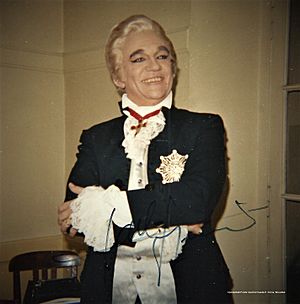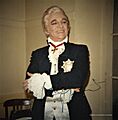Gabriel Bacquier facts for kids
Quick facts for kids
Gabriel Bacquier
|
|
|---|---|

As Scarpia in Tosca, Chicago
|
|
| Born |
Gabriel Augustin-Raymond-Théodore-Louis Bacquier
17 May 1924 Béziers, France
|
| Died | 13 May 2020 (aged 95) Lestre, Manche, France
|
| Occupation | Operatic baritone |
| Awards | |
Gabriel Bacquier (born May 17, 1924 – died May 13, 2020) was a famous French opera singer. He was known as a baritone, which is a male singer with a middle-range voice. Gabriel Bacquier was one of the best baritones of the 20th century. He was especially good at singing French and Italian operas. People thought he was a great singer and actor, whether he was in serious or funny roles. He also gave many song concerts.
He was a long-time member of the Opéra-Comique and the Paris Opera in France. But he also had a long career singing in major opera houses all over Europe and the United States. He recorded many songs over five decades, which means for 50 years! He was even called “the ambassador of French song.”
Contents
Early Life and Training
Gabriel Augustin-Raymond-Théodore-Louis Bacquier was born in Béziers, France, on May 17, 1924. He was the only child of parents who worked for the railway. As a young boy, he loved everything about singing. He listened to records, radio shows, and looked at photos of singers.
When he was 14, he left school and worked at his uncle's print shop. He also studied in Montpellier to become a commercial artist. During Vichy France, a time when France was occupied by Nazi Germany, his parents helped him avoid being forced to work. He did national service on the railways instead.
As a teenager, he took singing lessons in Béziers. He made his first opera appearance during World War II. He sang the role of Ourrias in Gounod's Mireille in his hometown. After the war, he went to the Conservatoire de Paris, a famous music school. He received a scholarship because his family didn't have much money. He graduated in 1950.
At the Conservatoire, he studied with other future famous French singers. In his last year, he was allowed to work at the Opéra de Nice. There, he sang small parts in operas and operettas. He also sang regularly in cinemas. This gave him important experience and helped him earn money. He won a first prize for comic opera and a first prize for singing. He also took a class in acting.
Opera Career in France and Belgium
In 1950, Gabriel Bacquier joined an opera company. From 1953 to 1956, he was a member of La Monnaie in Brussels, Belgium. He first appeared there as the main character in Rossini's Il barbiere di Siviglia. In Brussels, he sang many French operas, like Gounod's Faust and Massenet's Manon. He also sang in operettas, which are lighter, more humorous operas. He performed in Puccini's La bohème and Madama Butterfly too.
While at La Monnaie, a French singer named Martha Angelici sang with him. Her husband was the director of the Opéra-Comique in Paris. She suggested that Bacquier try out for the Paris company, and they accepted him.
Bacquier made his first appearance at the Opéra-Comique in Paris in 1956. He sang the role of Sharpless in Madama Butterfly. Soon after, he sang Alfio in Cavalleria rusticana and Albert in Werther. He later transferred to the Paris Opera. His official debut there was on September 21, 1959. He sang Germont in Verdi's La traviata. He quickly became known for roles like Valentin and Rigoletto.
In 1960, he sang as Scarpia in Puccini's Tosca with famous singer Renata Tebaldi. He also went with the company to Venice. In 1960, he performed at the Aix-en-Provence Festival as Mozart's Don Giovanni. This performance was broadcast across Europe by Eurovision. People in Vienna and London saw these shows. This led to him getting jobs outside France and starting his international career.
Becoming Internationally Famous
In 1962, Gabriel Bacquier was invited to the Glyndebourne Festival in England. He sang Count Almaviva in Mozart's Le nozze di Figaro. From 1963, he regularly sang at the Vienna State Opera in Austria and La Scala in Milan, Italy. Starting in 1964, he also performed at the Royal Opera House in London. His roles there included Sir Richard Forth in Bellini's I puritani and Doctor Bartolo in Il barbiere. He also appeared in a televised gala for Queen Elizabeth II's Silver Jubilee in 1977.
Bacquier first performed in America at a concert in Carnegie Hall. His first stage performance in the U.S. was with the Lyric Opera of Chicago in 1962. He sang the High Priest in Samson et Dalila. This was also his first role at the Metropolitan Opera in New York City on October 17, 1964. He performed there for 18 seasons. He was one of the few French singers to achieve such success there. He sang in a new production of Tosca with Birgit Nilsson and Franco Corelli.
He also sang often at the Philadelphia Lyric Opera Company from 1963 to 1968. His first role there was Zurga in Bizet's Les pêcheurs de perles. Other roles in Philadelphia included Nilakantha in Lakmé and Iago in Verdi's Otello. He made his debut at the San Francisco Opera in 1971. In 1978, he appeared at the Metropolitan Opera as Golaud. A reviewer from The New York Times said his singing was "delicate and yet weighted with feeling." Another singer, Thomas Allen, called Bacquier a "singer-actor." He meant that Bacquier was so good at both singing and acting, it was hard to tell if he was an actor who sang or a singer who acted.
Even though he was known for French operas, Bacquier didn't want to be limited to just those roles. He added many Italian roles to his list. These included Verdi roles like Renato in Un ballo in maschera and Falstaff. He also sang funny roles like Mozart's Leporello in Don Giovanni. In 1982, a critic in New York said Bacquier's performance as Bartolo in Il Barbiere di Siviglia was amazing. They noted that every part of his performance was perfectly timed.
Bacquier also tried some non-French and Italian roles, like Wolfram in Wagner's Tannhäuser and the main role in Mussorgsky's Boris Godunov. By the 1980s, Bacquier changed his roles to fit his voice as it changed. He focused on roles that he felt were more important. Many of his performances were recorded, so people can still listen to them today.
New Operas and Song Recitals
Gabriel Bacquier also helped create new operas. He sang the main roles in Jean-Pierre Rivière's Pour un Don Quichotte in Milan in 1961. He also sang in Daniel-Lesur's Andréa del Sarto in Marseille in 1969. A critic wrote that he showed "complete mastery, both as a vocalist and as an actor." Other new operas he performed in included Maurice Thiriet's La véridique histoire du Docteur and Menotti's Le Dernier Sauvage.
In May 1980, he sang the main role in a new opera called Cyrano de Bergerac by Paul Danblon. This was part of a celebration in Belgium. He also sang in two operas by Jean-Michel Damase. His last stage performance in Paris was in June 1994, in Don Pasquale. He continued to perform in concerts after that. For example, he sang in Berlioz's Béatrice et Bénédict in 2003.
He was also very active in singing mélodies, which are French art songs. He recorded songs by composers like Maurice Ravel and Francis Poulenc. Two live concerts of his mélodies from 1961 and 1972 were released on CD. In 2007, Bacquier recorded thirteen songs by the actor and songwriter Pierre Louki.
Later Career and Legacy
Gabriel Bacquier also taught singing. He taught at the vocal school of the Paris Opera and later at the Paris Conservatory until 1987. From 2001, he taught at the Académie de Musique de Monaco. There, he helped direct student opera productions.
He was also interviewed for a book about opera singers. In 2008, he was one of the main people to sign a petition. This petition was called Appel à la Refondation des Troupes de Théâtre Lyrique. It aimed to protect and promote French singing.
Gabriel Bacquier passed away on May 13, 2020, at his home in Lestre, France. He was almost 96 years old. Christophe Ghristi, the artistic director of the Théâtre du Capitole, said that Bacquier had a strong presence on stage. He also said that Bacquier was one of the few French singers of his time to have such a successful international career.
Awards and Honors
Gabriel Bacquier received many awards and honors in France. These included:
- Chevalier de la Légion d'Honneur (Knight of the Legion of Honor)
- Officier de L'Ordre national du Mérite (Officer of the National Order of Merit)
- Commandeur de L'Ordre des Arts et des Lettres (Commander of the Order of Arts and Letters)
Several of his recordings won important awards. For example, his recording of L'heure espagnole won the Prix du Disque in 1967. His recording of Enescu's Œdipe won a Grand Prix du Disque and a prize from the Ministry of Culture in 1984. In 2004, he received an Orphée d'Or Herbert von Karajan award for his career. He also won a Lauréat des Victoires de la Musique in the same year. The city of Paris also gave him a special medal.
Images for kids


